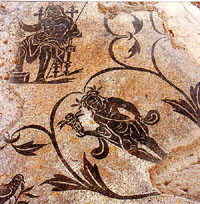However
Prima Porta is famous above all because it is the hill where it was build
one of the most famous imperial villas Livia Drusilla’s one Emperor
Augustus’ wife.
The
“ Villa Ad Gallinas Albas “ has an ancient history which is
possible to find again mentioned it in Plinio’s, Svetonio’s
and Cassio Dione’s ancient literary works. It was told that while
an eagle was flying over the villa left fall down from her heels a white
intense coloured hen symbol of pureness bringing in her billy-goat a twig
of laurel rich in berries. The hen was bred and the laurel branch was planted.
Now we have a forest of laurel. From that moment on Cesar ( Octavian ) brought
in his hand a branch of laurel who used to put on his head as a crown after
every won fight. Through many centuries all the Roman Emperors did that
besides to plant laurel branches on the won fight field. That is why in
all over Italy we have forests of laurel by the name of the Roman Emperors.
After the middle
of XIX century some excavations were carried out which they brought to light
some ancient ruines and objects of the Roman Empire of which one Augustus’
statue is preserved today at the Vatican Museums.
 The
monumental unit was articulated in two distinguished sectors: one with residential
neighbourhood and a vast thermal unit, the other maybe destinated as a garden.
The environments are decorated have mosaics and they are recognizable various
sorts of opus. One of the greatest attractions of the villa are the decorated
walls of the underground environments detached in 1951 and now preserved
at the Roman National Museum in the seat of Palazzo Massimo. They represent
in a fabulous scenery a luxuriant articulated garden in an alley with little
exedrae at the inner of which some ornamental and fruit-bearing plants grow
up. The decorated walls were discovered in 1863 together with the famous
and majestic statue of the Emperor Augustus said also the “ Augustus
of Prima Porta “ that is a prototype of the official Imperial portraiture.
The
monumental unit was articulated in two distinguished sectors: one with residential
neighbourhood and a vast thermal unit, the other maybe destinated as a garden.
The environments are decorated have mosaics and they are recognizable various
sorts of opus. One of the greatest attractions of the villa are the decorated
walls of the underground environments detached in 1951 and now preserved
at the Roman National Museum in the seat of Palazzo Massimo. They represent
in a fabulous scenery a luxuriant articulated garden in an alley with little
exedrae at the inner of which some ornamental and fruit-bearing plants grow
up. The decorated walls were discovered in 1863 together with the famous
and majestic statue of the Emperor Augustus said also the “ Augustus
of Prima Porta “ that is a prototype of the official Imperial portraiture.
|
|
|
|||||||||||||||||||||||||
|
|
 |
|
|
|||||||||||||||||||||||
 |
 |
|
|
|||||||||||||||||||||||
|
|
|
|
|
|||||||||||||||||||||||
|
|
|
|||||||||||||||||||||||||
|
|
|
|||||||||||||||||||||||||
|
|
|
|||||||||||||||||||||||||
|
|
|
|||||||||||||||||||||||||
|
|
|
|
|
|
|
|
|
|||||||||||||||||||
|
|
|
|
|
|
|
|||||||||||||||||||||
|
|
|
|||||||||||||||||||||||||
 |
|
|||||||||||||||||||||||||
|
|
 |
|
||||||||||||||||||||||||
 |
|
|||||||||||||||||||||||||
|
|
|
|
|
|||||||||||||||||||||||
|
|
|
|||||||||||||||||||||||||
|
|
|
|
||||||||||||||||||||||||
 |
|
|||||||||||||||||||||||||
 |
|
|
||||||||||||||||||||||||
|
|
|
|||||||||||||||||||||||||
|
|
|
|
|
|||||||||||||||||||||||
|
|
|
|||||||||||||||||||||||||
|
|
|
|
|
|
|
|
|
|
|
|
|
|
|
|
|
|
|
|
|
|
|
|
|
|
|
|